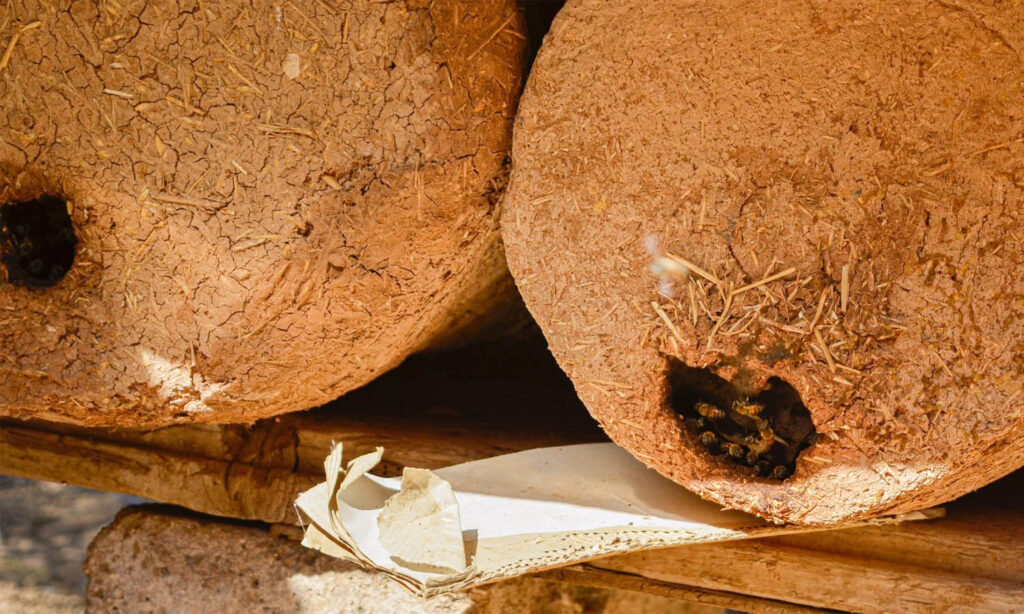Enab Baladi – Majd al-Salem
Farmer Alaa al-Hussein, 48, seeks to secure new sources of income for his 6-member family after the repeated droughts that hit the southern countryside of Qamishli and affected the agricultural sector in areas controlled by the Autonomous Administration of North and East Syria (AANES).
The severe drought caused great losses to farmers in northeastern Syria, which prompted them to search for compensation with small projects as a source of income.
Al-Hussein told Enab Baladi that he resorted to beekeeping with the help of an experienced breeder, taking advantage of the cotton fields scattered in his area.
He succeeded in producing about 12 kilograms of honey in September, considering it a good start, as he benefited from the recent rise in honey prices, reaching 80,000 Syrian pounds (about 15 US dollars).
Al-Hussein plans to increase the number of his beehives and continue to learn modern beekeeping methods from experienced breeders while achieving an income of nearly one million Syrian pounds (about 195 US dollars) at the beginning of his production.
Beekeeping is widespread in the northern countryside of al-Hasakah governorate, from the town of Amuda to the city of al-Malikiyah, but it is a profession that is greatly affected by the surrounding environmental and atmospheric factors.
Beekeeping is declining
The agricultural engineer, Yasser Mahmoud, told Enab Baladi that the reality of beekeeping in al-Hasakah governorate cannot be described as good, especially with the “significant” decline in work in the past years, despite the recent interest in beekeeping by farmers.
He added that the current demand for beekeeping is a “temporary situation,” as farmers see this profession as an alternative to their work in agriculture, which is no longer ensuring an acceptable income for them.
The agricultural engineer attributed the reasons for the deterioration of the beekeeping sector in al-Hasakah to the drought that destroyed the natural pastures, as well as reducing the diversity of flowers and green spaces preferred by bees.
One of the reasons is the reckless and irresponsible use of insecticides near beekeeping places, as thousands of these hives died affected by the pesticides.
It also led to the deterioration of the environment in which bees live, the spread of so-called “burners” (makeshift oil refineries) during the past years, and the release of “tons of coal soot, smoke, and toxic gasses.
Engineer Mahmoud considered that the high cost of materials and tools necessary for the breeding process, the ignorance of some breeders about the methods of beekeeping, and the dependence of others on breeding in “clay cells” that are not well equipped to incubate the queen and bees, was a factor in the decline of beekeeping in the region.
Price is set due to demand
The motives of beekeeping today are limited to the recent rise in honey prices, as it has become a means of generating income if the breeding process is close to running rivers and cotton fields, according to the agricultural engineer.
The beekeeping sector is also facing difficulties, given the cost of materials needed for beekeeping compared to last year.
The price of a suit worn by beekeepers was 9 US dollars last year, while it jumped to 13 US dollars at the beginning of this year, in addition to many other items that have increased in price by about 35%, such as protein paste, pollen, or even gloves.
Samir Mohammed, 29, owner of a food store in Qamishli, told Enab Baladi that the demand for buying honey has become commercially feasible, as he sells a kilogram at the price of 75,000 SYP(15 USD), while its price last year was about 40,000 SYP (8 USD).
Mohammed considered that this demand for honey at the present time is for a therapeutic purpose, as it is included in many medical prescriptions prepared by workers in “Prophetic medicine,” which is common in the region.
Lack of AANES support
Workers in the field of beekeeping and merchants whom Enab Baladi interviewed in al-Hasakah spoke about the lack of support of the Autonomous Administration of North and East Syria (AANES), whether with regard to providing the necessary tools at reasonable prices or even enacting laws prohibiting the use of pesticides and chemical fertilizers near beekeeping areas or controlling its excessive use.
According to beekeepers, this profession has been negatively affected in most of the Syrian regions due to the war and other circumstances, most notably the siege that prevented beekeepers from moving freely and taking good care of bees, as these are the basics of beekeeping.
Engineer Yasser Mahmoud said that the villages adjacent to the Turkish border, or what is known locally as the “Line 10 lands”, are good for beekeeping because they are free of primitive oil refineries and are located within an area with an “acceptable” rainfall rate, but the area is considered at the same time dangerous for civilians due to the almost daily clashes between the Turkish border guards and the Syrian Democratic Forces (SDF).
The same applies to the Khabour Basin area on both sides of the Euphrates River from the southern countryside of Ras al-Ain to the southern countryside of Tal Tamer, which was famous for beekeeping to provide water and pastures, but 80% of the hives and the quantities of existing bees disappeared as a result of military actions and the displacement movement in the area, Mahmoud said.











